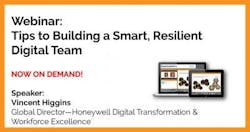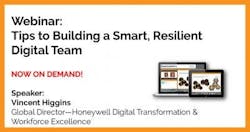Tips to build a resilient workforce in the modern manufacturing era
Today we preview that presentation, talking about modern workforces, revenue generation and experiential learning. Take a look…
Smart Industry: What do you mean by a "resilient workforce." How is this concept changing in the digital era?
Vincent: A resilient workforce, in simple terms, is a dynamic group of people who are able to withstand difficult circumstances, assess situations and work accordingly, come with new ideas, and help the organization drive forward during difficult times.
The increasingly digital world of business, coupled with the rise of technologies such as artificial intelligence, robotics and automation, are changing the game—putting pressure on companies to deliver products and services in a faster, more efficient, and streamlined manner. To succeed, organizations need workers who are competent, agile and adaptable.
Smart Industry: What is a common example of a workforce challenge that can be turned into a revenue generator?
Vincent: During the past five years, we’ve experienced a metamorphosis in how day-to-day work is performed at industrial facilities, coinciding with the arrival of Millennials into the workforce. Research shows Millennials respond better to experiential learning than to passive methods such as listening to lectures or watching presentations. Therefore, conventional training practices are being replaced with techniques based on augmented reality (AR), virtual reality (VR), and data analytics. Experiential learning gives millennials what they crave—the opportunity to learn by doing, without the real-life safety risks.
Whether on a headset or mobile device, augmented reality technology cuts maintenance time and improves accuracy, which has positive impact towards day-to-day operations. Using VR, a trainee might walk around a virtual plant to locate or perform maintenance on a pump or flow meter.
Smart Industry: What is an exciting change related to workforce management in the Industry 4.0 era?
Vincent: Workforce excellence and resilience is not a new concept, but it’s one that has traditionally been applied to desk-bound employees rather than industrial field workers.
High-performing companies of the future will focus on enabling their workforces to accomplish more with technology. They must foster new cultures that harness technology to enable people to constantly adapt and learn, create new solutions, drive change and disrupt the status quo.

